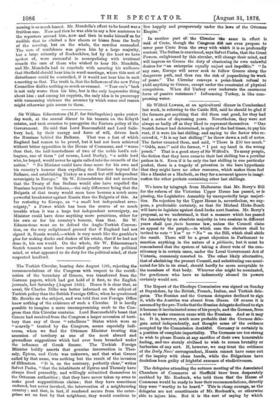Sir William Edmonstone (M.P. for Stirlingshire) spoke yester- day week,
at the annual dinner to his tenants on the Kilsyth estates, and took occasion to panegyrise the Eastern policy of the Government. He said that Lord Beaconsfield and Lord Salis- bury bad, by their energy and force of will, driven back the Russians behind the Balkans. That was a feat of which England had reason to be proud, but it had not been achieved without bitter opposition in the House of Commons, and "worse than that, the half-heartedness of two of the noble lord's col- leagues, one of them" (of course, Lord Derby), "a noble lord who, he hoped, would never be again called into the councils of the nation." "No Minister could have done more for his own and his country's honour than expelling the Russians beyond the Balkans, and establishing Turkey as a small but still independent sovereignty in Europe." Sir W. Edmondstone did not mention that the Treaty of San Stefano would also have expelled the Russians beyond the Balkans,—the only difference being that the Bulgaria of that treaty would soon have become a much more powerful breakwater against Russia than the Bulgaria of this. As for restoring to Europe, as "a small but independent sove- reignty," a Power which has been the source of so much trouble when it was a large but independent sovereignty, no Minister could have done anything more pernicious, either for his own or for his country's honour, than that. Sir W. Edmonstone went on to defend the Anglo-Turkish Conven- tion, on the very enlightened ground that if England had not signed it, Russia would,—which is very much like the gambler's plea for making ducks and drakes of his estate, that if he had not done it, his son would. On the whole, Sir W. Edmonstone's Scotch tenants must have marvelled greatly over the political mind, or what appeared to do duty for the political mind, of their respected landlord.






























 Previous page
Previous page